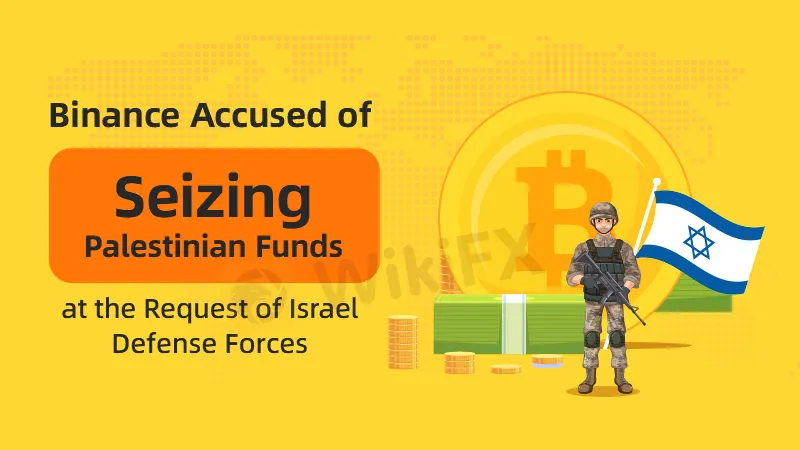简体中文
繁體中文
English
Pусский
日本語
ภาษาไทย
Tiếng Việt
Bahasa Indonesia
Español
हिन्दी
Filippiiniläinen
Français
Deutsch
Português
Türkçe
한국어
العربية
Binance Accused of Seizing Palestinian Funds at the Request of Israel Defence Forces
Abstract:Binance, the leading global cryptocurrency exchange, is facing allegations of seizing funds from Palestinian users at the behest of the Israel Defence Forces (IDF).

Binance, the leading global cryptocurrency exchange, is facing allegations of seizing funds from Palestinian users at the behest of the Israel Defence Forces (IDF). This claim has sparked significant controversy, raising questions about Binance's adherence to international financial regulations and its role in politically sensitive regions.
The allegations came to light through Ray Youssef, co-founder of Paxful and CEO of the Noones P2P platform. Youssef took to X (formerly Twitter) to accuse Binance of confiscating funds from Palestinian users following a request from the IDF. He argued that Binance's actions were grounded in Israels anti-terrorism laws, which authorize the temporary seizure of assets, including cryptocurrency, from organizations labelled as terrorist entities.
Youssef went on to claim that Binance has steadfastly refused to return the confiscated funds, ignoring all appeals from the affected users. He cautioned that similar actions might soon target users in Lebanon and Syria, invoking the cryptocurrency communitys cautionary phrase, “Not your keys, not your coins,” which warns against the risks of entrusting digital assets to third-party platforms.

The legal framework cited for Binance's actions includes a letter from Israel‘s National Bureau for Counter Terror Financing, allegedly signed by Paul Landes. This letter, written in Hebrew, outlined that Israel’s anti-terrorism laws permit the confiscation of cryptocurrency assets transferred by or to entities designated as terrorist organizations. The letter was reportedly used as a basis for the seizure of Palestinian users' funds.
In response to these serious allegations, Binance has publicly denied the claim that it indiscriminately seized funds from all Palestinian users. The exchange, in a statement to Cointelegraph, clarified that it had only restricted accounts linked to illicit activities. Binance insisted that the number of affected users was small and that the actions taken were consistent with its obligations under international sanctions legislation, mirroring the practices of other financial institutions. A spokesperson for Binance also expressed hope for enduring peace in the region, although the exchange did not provide specifics on the timing of these account restrictions or the exact number of users affected.
This incident further complicates Binances ongoing struggles with regulatory scrutiny. The exchange has been at the centre of multiple legal challenges, including a recent lawsuit accusing it of involvement in laundering stolen cryptocurrency. The current controversy, involving allegations of politically motivated asset seizures, underscores the complexities that global cryptocurrency platforms face in navigating regulatory and ethical dilemmas in conflict-prone regions.
While Palestine constitutes a minor share of Binance‘s overall traffic, data from SimilarWeb revealed that traffic from Palestine to Binance’s platform increased by more than 80% since August 2023. This surge, combined with the recent allegations, has amplified concerns among users in the region about the security and control of their assets on the platform. As the situation continues to develop, Binance's handling of these issues will be closely watched by the global cryptocurrency community and regulatory bodies alike.
This controversy is likely to fuel further debate about the role of cryptocurrency exchanges in politically sensitive regions and the broader implications for user security and trust.

Disclaimer:
The views in this article only represent the author's personal views, and do not constitute investment advice on this platform. This platform does not guarantee the accuracy, completeness and timeliness of the information in the article, and will not be liable for any loss caused by the use of or reliance on the information in the article.
Read more

Coinbase Under Scrutiny Amid Wrapped Bitcoin Delisting Controversy
Coinbase has come under fire after announcing its decision to delist Wrapped Bitcoin (wBTC), a move critics claim could be driven by competitive interests. The delisting, set to take effect on 19 December, has sparked allegations of market manipulation and concerns about fairness in the cryptocurrency ecosystem.

Solana Soars to All-Time High, Hits $264 on Coinbase
Solana hits $264 on Coinbase, breaking its 3-year high with an 11% daily surge. Learn what’s driving SOL's meteoric rise and the crypto market rally.

Bitcoin Nears $100,000: A Triumph of Optimism or a Warning Sign?
Bitcoin’s meteoric rise continues to capture global attention as its price recently surpassed the $99,000 mark, briefly approaching the $100,000 milestone. This unprecedented rally has led market sentiment to reach a state of “extreme greed,” according to the Fear and Greed Index. Analysts suggest that the market may be entering overheated territory, raising questions about sustainability amidst ongoing enthusiasm.

FCA Alerts Traders to New List of Unregulated and Clone Brokers
Protect your investments! Learn about unregulated firms flagged by the FCA and discover how WikiFX helps traders avoid scams and choose legitimate brokers.
WikiFX Broker
Latest News
Hackers Charged for $11M Crypto Theft Using SIM-Swaps
Role of Central Banks in the FX Market
FCA Alerts Against Sydney FX
What Makes Cross-Border Payments Easier Than Ever?
Trader Exposes Unethical Practices by STP Trading
Bitcoin Nears $100,000: A Triumph of Optimism or a Warning Sign?
Malaysian Man Loses RM113,000 in Foreign Currency Investment Scam
Mastercard Partners with JPMorgan for B2B Cross-Border Payments
FCA Identifies Clone Firm Exploiting Admiral Markets' Credibility
Coinbase Under Scrutiny Amid Wrapped Bitcoin Delisting Controversy
Currency Calculator


